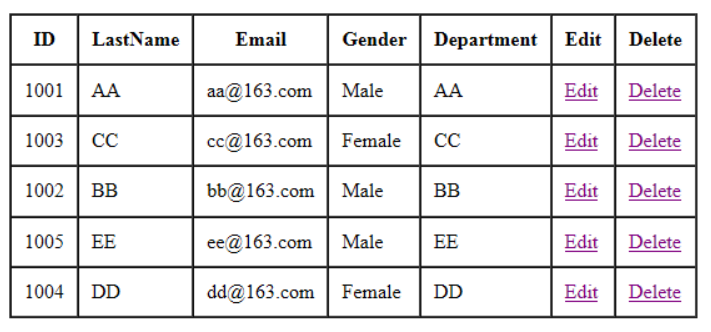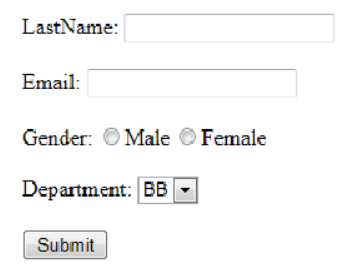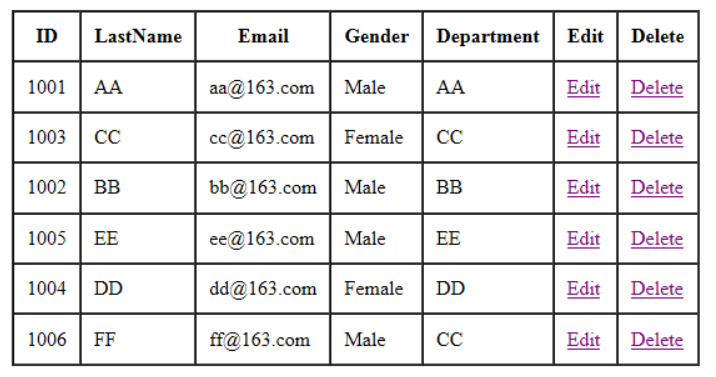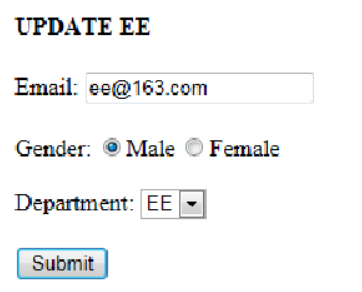一、Restful_CRUD 需求
1、显示所有员工信息
URI:emps
请求方式:GET
效果:

2、添加员工信息
(1)显示添加页面:
URI:emp
请求方式:GET
显示效果:

(2)添加员工信息
URI:emp
请求方式:POST
显示效果:完成添加,重定向到 list 页面

3、删除操作
URL:emp/{id}
请求方式:DELETE
删除后效果:对应记录从数据表中删除
4、修改操作:lastName 不可修改!
(1)显示修改页面
URI:emp/{id}
请求方式:GET 显示效果:回显表单
(2)修改员工信息
URI:emp
请求方式:PUT
显示效果:完成修改,重定向到 list 页面
效果: 
二、环境搭建
1、添加依赖
2、创建配置文件:springmvc.xml
<?xml version="1.0" encoding="UTF-8"?>
<beans xmlns="http://www.springframework.org/schema/beans"
xmlns:xsi="http://www.w3.org/2001/XMLSchema-instance"
xmlns:context="http://www.springframework.org/schema/context"
xmlns:mvc="http://www.springframework.org/schema/mvc"
xsi:schemaLocation="http://www.springframework.org/schema/beans
http://www.springframework.org/schema/beans/spring-beans.xsd
http://www.springframework.org/schema/context
http://www.springframework.org/schema/context/spring-context.xsd http://www.springframework.org/schema/mvc http://www.springframework.org/schema/mvc/spring-mvc.xsd">
<!-- 扫描所有的组件 -->
<!-- 扫描组件,将加上@Controller注解的类作为springMVC的控制层 -->
<context:component-scan base-package="com.njf.rest"></context:component-scan>
<!-- 配置一个视图解析器 :能帮我们拼接页面地址-->
<bean class="org.springframework.web.servlet.view.InternalResourceViewResolver">
<property name="prefix" value="/WEB-INF/pages/"></property>
<property name="suffix" value=".jsp"></property>
</bean>
<!--
配置Tomcat中默认的servlet,DefaultServlet
注意:当DefaultServlet所设置的<url-pattern>的值和开发人员所配置的servlet的<url-pattern>相同,以开发人员所配置的servlet优先
作用:当客户端发送请求,由于DefaultServlet所设置的<url-pattern>的值和开发人员所配置DispatcherServlet的<url-pattern>都是/
因此先通过DispatcherServlet处理请求,找该请求是否有相对应的处理器,有则处理,无则交给DefaultServlet处理
-->
<!-- 默认前端控制器是拦截所有资源(除过jsp),js 文件就404了,要js文件请求是交给Tomcat来处理 -->
<!--告诉SpringMVC,自己映射的请求就自己处理,不能处理的请求直接交给 Tomcat-->
<!--静态资源能访问,动态映射的请求就不行-->
<mvc:default-servlet-handler/>
<!-- mvc驱动 SpringMVC 可以保证动态请求和静态请求都能访问-->
<mvc:annotation-driven />
</beans>
3、web.xml 相关配置
<?xml version="1.0" encoding="UTF-8"?>
<web-app xmlns="http://java.sun.com/xml/ns/javaee"
xmlns:xsi="http://www.w3.org/2001/XMLSchema-instance"
xsi:schemaLocation="http://java.sun.com/xml/ns/javaee
http://java.sun.com/xml/ns/javaee/web-app_3_0.xsd"
version="3.0">
<welcome-file-list>
<welcome-file>index.jsp</welcome-file>
</welcome-file-list>
<!-- 前端控制器(核心控制器) -->
<servlet>
<servlet-name>DispatcherServlet</servlet-name>
<servlet-class>org.springframework.web.servlet.DispatcherServlet</servlet-class>
<!-- 配置DispatcherServlet的初始化參數:设置文件的路径和文件名称 -->
<init-param>
<param-name>contextConfigLocation</param-name>
<param-value>classpath:springmvc.xml</param-value>
</init-param>
<!--
servlet 启动加载,servlet 原本是第一次访问创建对象
load-on-startup:服务器启动的时候就创建对象,值越小优先级越高,越先创建对象
-->
<load-on-startup>1</load-on-startup>
</servlet>
<!--
/* 和 / 都是拦截所有请求,/:会拦截所有请求,但是不会拦截 *.jsp,能保证 jsp访问正常;
/* 的范围更大,还会拦截 *.jsp 这些请求,一旦拦截 jsp 页面就不能显示了
-->
<servlet-mapping>
<servlet-name>DispatcherServlet</servlet-name>
<url-pattern>/</url-pattern> <!-- / 这样写,只有请求才处理,页面会过滤掉 -->
</servlet-mapping>
<!-- 字符编码过滤器 -->
<filter>
<filter-name>characterEncodingFilter</filter-name>
<filter-class>org.springframework.web.filter.CharacterEncodingFilter</filter-class>
<!-- 设置字符编码 -->
<init-param>
<param-name>encoding</param-name>
<param-value>UTF-8</param-value>
</init-param>
<!-- 强制设置响应进行编码 -->
<init-param>
<param-name>forceEncoding</param-name>
<param-value>true</param-value>
</init-param>
</filter>
<filter-mapping>
<filter-name>characterEncodingFilter</filter-name>
<url-pattern>/*</url-pattern> <!-- 对所有的请求都拦截,处理所有响应-->
</filter-mapping>
<!-- REST 风格过滤器-->
<filter>
<filter-name>HiddenHttpMethodFilter</filter-name>
<filter-class>org.springframework.web.filter.HiddenHttpMethodFilter</filter-class>
</filter>
<filter-mapping>
<filter-name>HiddenHttpMethodFilter</filter-name>
<url-pattern>/*</url-pattern>
</filter-mapping>
</web-app>
4、增加实体类
Department:
public class Department {
private Integer id;
private String departmentName;
}
Employee:
public class Employee {
private Integer id;
private String lastName;
private String email;
private Integer gender;
private Department department;
}
5、增加 dao 层
DepartmentDao 层:
@Repository
public class DepartmentDao {
private static Map<Integer, Department> departments = null;
static{
departments = new HashMap<Integer, Department>();
departments.put(101, new Department(101, "D-AA"));
departments.put(102, new Department(102, "D-BB"));
departments.put(103, new Department(103, "D-CC"));
departments.put(104, new Department(104, "D-DD"));
departments.put(105, new Department(105, "D-EE"));
}
public Collection<Department> getDepartments(){
return departments.values();
}
public Department getDepartment(Integer id){
return departments.get(id);
}
}
EmployeeDao 层:
@Repository
public class EmployeeDao {
private static Map<Integer, Employee> employees = null;
@Autowired
private DepartmentDao departmentDao;
static{
employees = new HashMap<Integer, Employee>();
employees.put(1001, new Employee(1001, "E-AA", "aa@163.com", 1, new Department(101, "D-AA")));
employees.put(1002, new Employee(1002, "E-BB", "bb@163.com", 1, new Department(102, "D-BB")));
employees.put(1003, new Employee(1003, "E-CC", "cc@163.com", 0, new Department(103, "D-CC")));
employees.put(1004, new Employee(1004, "E-DD", "dd@163.com", 0, new Department(104, "D-DD")));
employees.put(1005, new Employee(1005, "E-EE", "ee@163.com", 1, new Department(105, "D-EE")));
}
private static Integer initId = 1006;
public void save(Employee employee){
if(employee.getId() == null){
employee.setId(initId++);
}
employee.setDepartment(departmentDao.getDepartment(employee.getDepartment().getId()));
employees.put(employee.getId(), employee);
}
public Collection<Employee> getAll(){
return employees.values();
}
public Employee get(Integer id){
return employees.get(id);
}
public void delete(Integer id){
employees.remove(id);
}
}
三、显示所有员工信息
思路:
员工列表展示:访问 index.jsp -->直接发送/emps --> 控制器查询所有员工 -->放在请求域中-->转发到 list 页面展示
1、添加访问链接
<%@ page contentType="text/html;charset=UTF-8" language="java" %>
<html>
<body>
<h2>Hello World!</h2>
<a href="/hello">测试</a>
<a href="/emps">员工信息</a>
<%--访问项目就要展示员工列表页面--%>
<jsp:forward page="/emps"></jsp:forward>
</body>
</html>
2、控制器
@RequestMapping(value = "/emps", method = RequestMethod.GET)
public String getEmps(Model model) {
Collection<Employee> emps = employeeDao.getAll();
//默认放到 request 域中
model.addAttribute("emps", emps);
return "list";
}
3、SpringMVC 中没遍历的标签,需要使用 jstl 标签进行集合遍历增加 jstl 标签库 jar 包
<%@ page contentType="text/html;charset=UTF-8" language="java" %>
<%@ taglib uri="http://java.sun.com/jsp/jstl/core" prefix="c" %>
<html>
<head>
<title>员工信息</title>
</head>
<body>
<h2>员工信息</h2>
<c:if test="${empty requestScope.emps }">
对不起,没有找到任何员工!
</c:if>
<c:if test="\${!empty requestScope.emps }">
<table border="1" cellpadding="10" cellspacing="0" >
<tr>
<th>编号</th>
<th>姓名</th>
<th>邮箱</th>
<th>性别</th>
<th>部门</th>
<th>操作(<a href="emp">ADD</a>)</th>
</tr>
<c:forEach items="${requestScope.emps }" var="emp">
<tr>
<td>${emp.id }</td>
<td>${emp.lastName }</td>
<td>${emp.email }</td>
<td>${emp.gender == 0 ? '女':'男' }</td>
<td>${emp.department.departmentName }</td>
<td>
<a href="emp/${emp.id }">UPDARE</a>
<a class="del" href="emp/${emp.id }">DELETE</a>
</td>
</tr>
</c:forEach>
</table>
</c:if>
</body>
</html>
四、添加操作
分析:
员工添加 --> 来到添加页面(add.jsp)--->输入员工数据 --> 点击保存 ---> 处理器收到员工请求保存请求(保存员工) -->保存完毕,来到列表页面
1、在 list.jsp 页面上添加链接
<th>操作(<a href="/toAddPage">ADD</a>)</th>
2、跳转到添加页面,并把部门信息放在请求域中
/**
* 去添加页面,把需要的部门信息放在请求域中带到页面
* @param model
* @return
*/
@RequestMapping(value = "/toAddPage", method = RequestMethod.GET)
public String toAddPage(Model model) {
Collection<Department> depts = departmentDao.getDepartments();
//默认放到 request 域中
model.addAttribute("depts", depts);
return "add";
}
3、添加信息页面
<%@ page contentType="text/html;charset=UTF-8" language="java" %>
<%@ taglib uri="http://java.sun.com/jsp/jstl/core" prefix="c" %>
<html>
<head>
<title>添加员工信息</title>
</head>
<body>
<h2>添加员工信息</h2>
<form action="/emp" method="post">
lastName:<input name="lastName" type="text"/><br/>
email:<input name="email" type="text"/><br/>
gender:<br>
男 <input type="radio" name="gender" value="1"><br/>
女 <input type="radio" name="gender" value="0"><br/>
dept:
<select name="department.id">
<c:forEach items="${depts}" var="dept">
<option value="${dept.id}">${dept.departmentName}</option>
</c:forEach>
</select>
<br>
<input type="submit" value="保存">
</form>
</body>
</html>
4、添加完毕,进行提交,并重定向到员工列表页面
@RequestMapping(value = "/emp", method = RequestMethod.POST)
public String addEmp(Employee employee) {
employeeDao.save(employee);
//重定向到 emps 查询所有,然后在 list.jsp 显示
return "redirect:/emps";
}
五、删除操作
这是一个删除操作,如果要使用 REST 风格,必须发送 DELETE 请求。
所以,在这里,需要借助 HiddenHttpMethodFilter 过滤器,将 删除操作必须通过 POST 请求转换为 DELETE 请求。
1、页面链接
<head>
<%
pageContext.setAttribute("ctp", request.getContextPath());
%>
<title>员工信息</title>
<script type="text/javascript" src="${ctp}/js/jquery-1.8.2.min.js"></script>
</head>
...
<td>
<a href="${ctp}/emp/${emp.id}">UPDARE</a>
<a class="del" href="${ctp}/emp/${emp.id }">DELETE</a>
</td>
...
<form id="del_from" action="${ctp}/emp/${emp.id }" method="post">
<input type="hidden" name="_method" value="DELETE">
</form>
<script>
$(".del").click(function() {
if (confirm("确定删除吗?")) {
$("#del_from").attr("action", $(this).attr("href")).submit();// this.href == $(this).attr("href")
return false;
}
//将超链接的默认行为取消
return false;
});
</script>
2、控制器方法
@RequestMapping(value = "/emp/{id}", method = RequestMethod.DELETE)
public String deleteEmpById(@PathVariable("id") Integer id) {
employeeDao.delete(id);
return "redirect:/emps";
}
图解: 
3、静态资源不可用
HiddenHttpMethodFilter 过滤器 发起请求,无法执行,因为 delete 请求必须通过 post 请求转换为 delete 请求,借助:HiddenHttpMethodFilter 过滤器
六、修改操作
1、页面请求链接
<a href="emp/${emp.id }">UPDARE</a> //把员工的 id 传过去,使数据能够回显
2、控制器方法
/**
* 获取要回显的数据,跳转到修改页面,并回显
* @param id
* @param map
* @return
*/
@RequestMapping(value="/emp/{id}", method=RequestMethod.GET)
public String toUpdate(@PathVariable("id") Integer id, Map<String, Object> map) {
//获取要修改的员工的信息
Employee emp = employeeDao.get(id);
//查询所有的部门信息,供用户选择
Collection<Department> depts = departmentDao.getDepartments();
map.put("emp", emp);
map.put("depts", depts);
return "update";
}
/**
* 修改员工信息
* @param employee
* @return
*/
@RequestMapping(value="/emp", method=RequestMethod.PUT)
public String updateEmp(Employee employee) {
employeeDao.save(employee);
return "redirect:/emps"; //重定向到 emps,查询员工在 list.jsp 显示
}


 浙公网安备 33010602011771号
浙公网安备 33010602011771号